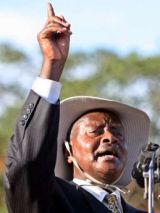Uganda’s Museveni keeps his cows waiting
Feb 26, (KAMPALA) — “The problem of Africa in general and Uganda in particular is not the people but leaders who want to overstay in power.”
 Words, perhaps, from one of the losing candidates after Uganda’s President Yoweri Museveni — already in power for two decades — won re-election on Saturday?
Words, perhaps, from one of the losing candidates after Uganda’s President Yoweri Museveni — already in power for two decades — won re-election on Saturday?
No, a quotation from Museveni himself in 1986.
After the triumph of his 1981-86 guerrilla war, the then young liberator was not shy in expressing his disgust for long-serving African “Big Men” including his autocratic Ugandan predecessors Idi Amin, Milton Obote and Tito Okello.
But after winning re-election to earn another five years in power, Museveni, now 62, is content to have transformed himself into one of the continent’s very biggest men — a benevolent one in his view; of the despotic kind according to critics.
Museveni’s next challenges are how to handle Western donors who once adored him but now view him as over-staying his welcome, and a re-invigorated opposition that has given him the biggest political challenge of his rule.
The president — who has long said he will happily go back to looking after his cattle in the rural west once he leaves office — won with a reduced but still convincing 59 percent.
His nearest rival, Kizza Besigye, took 37 percent of the vote. He won strong urban support but failed to eat into the president’s popularity in the countryside.
DONOR DILEMMA
Museveni’s win leaves Western donors in a dilemma.
Unhappy that the constitution was changed to allow him to run for a third term, they were further infuriated by the brief detention of Besigye prior to the election on rape and treason charges, which then hampered his campaign.
Some, including Britain, the main donor and former colonial power, cut aid.
Now, however, they must continue dealing with Museveni, knowing further aid suspensions will only hurt Uganda’s 27 million people, many of whom live in extreme poverty.
“The reaction of Western governments will generally be one of resignation,” said British analyst Tom Cargill.
“Although no one will be particularly excited about it, most Western countries have accepted Museveni is here to stay, and they are not so unhappy given that stability is a major concern for many donors.”
With the notable exception of the north, where Lord’s Resistance Army (LRA) rebels have been terrorising the local population for 20 years, Museveni has kept peace in Uganda, despite war and turmoil elsewhere in the region.
The pronouncement by international observers that the elections were broadly free and fair — albeit with some problems including names missing from the registers — should give the West some cover to swallow its qualms, diplomats said.
But relations are unlikely to ever return to the rosy times when he was hailed as the leading light among a new generation of enlightened African leaders.
Museveni used fiery anti-donor rhetoric in the campaign but is now likely to tone this down and return to pragmatism himself — since donors fund nearly 50 percent of Uganda’s budget.
GROWING TREND?
He is one of a clutch of leaders in the region whose lustre has dimmed of late in Western eyes.
The reputations of Meles Zenawi of Ethiopia and Mwai Kibaki of Kenya have suffered from political repression and corruption respectively. Eritrea’s Isaias Afwerki is also accused of autocratic traits.
And some fear Museveni’s third term could encourage other long-term African incumbents such as Nigeria’s Olesgun Obasanjo to follow suit.
With the polls over, the president also faces a challenge handling Besigye and his Forum for Democratic Change (FDC).
Should he prove his democratic credentials by working with them and easing the legal pressure on Besigye, or should he drive home his win by wiping them off the map?
Besigye’s future is unclear.
Given the poor performance of other presidential candidates, he is the undisputed leader of the anti-Museveni forces in Uganda. His party has rejected the election results and plans to take fraud claims to court.
But if the court cases against him build up steam, he may be tempted to go abroad again, as he did after the 2001 election.
Beyond the politics, Ugandans on all sides pray Museveni will be able to do something about the war in the north and improve their standards of living.
“I didn’t vote for him. I think it’s time he should go,” said John Bashir, 27, who has been unemployed since leaving university with a business degree. “But as we’re stuck with him, may God help him find me a job.”
(Reuters)
